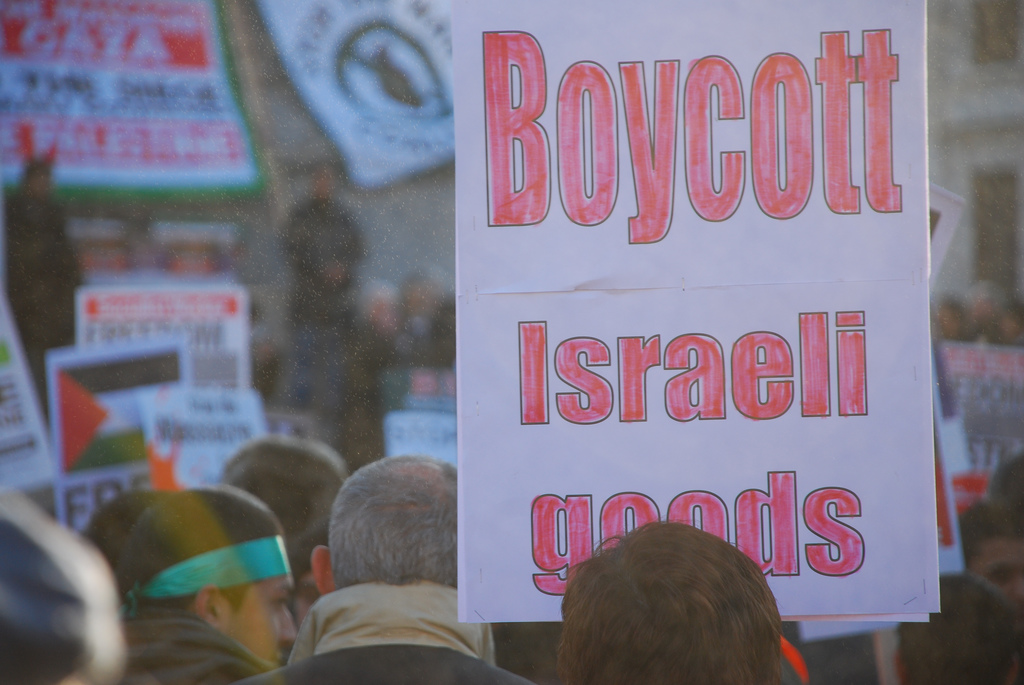2014 is the year of Solidarity with the Palestinian People according to the United Nations General Assembly. Now, more than ever before, activists are getting the word out about the Boycott, Divestment, Sanctions (BDS) campaign.
Originally a call to action by 170 Palestinian civil society organizations in July 2005, the BDS movement seeks to put international nonviolent pressure on Israel by limiting its cultural, academic and economic sway until the self-determination of the Palestinian people is respected. Specifically, the campaign demands Israel ends its occupation of Palestinian territory, recognize the right for equality for Palestinian people and allow Palestinian refugees to return to their properties. Where governments have failed to act, people have found ways to take meaningful action.
Not only has the BDS movement become a powerful force with a track record of successes, but it’s a movement that has welcomed intersectional organizing. To inspire more amazing actions this Israeli Apartheid Week, here are the top five successes of the BDS movement so far:
1) Encouraging universities to divest through campus activism
Student and graduate student unions from around the world continue to show solidarity with the BDS campaign. There are nine university student unions that have voted to support BDS in Canada alone. By organizing to expose university investments and demand divestment, students have followed through on threats against companies supporting injustices in occupied Palestinian territory, leading to harsh an economic reality. Universities have divested millions of dollars from multinational companies with ties to Israel due to student pressure. In 2013, the University of Oslo terminated its contract with the security company used on campus, G4S, after successful student campaigns. Students in the United Kingdom have also been able to spur their universities to action, with contracts terminated at campuses in Edinburgh, Kent and Dundee.
With the sound support of scholars, academic boycotts have also brought injustices to light by refusing to attend academic conferences in Israel and cutting ties with scholars who support the current system of discrimination in Israel. Notably, Judith Butler, Noam Chomsky and Stephen Hawking have spoken out about BDS, just to name a few. In 2013 the American Studies Association adopted an academic boycott of Israel.
2) Spreading the movement through union organizing
Palestinian trade unions have successfully reached out to other workers; support for BDS policies has come from major international trade unions federations. Millions of members from countries like France, South Africa, Norway and Canada (and many more) have recognized the importance of standing in solidarity with the Palestinian people. Locally, The South African Municipal Workers Union set up campaigns to have “Israeli Apartheid free Zones,” encouraging full divestment of cultural, academic, economic and sporting linkages with the Israeli government within municipalities. Trade union activists in Ireland and Australia have also run similar campaigns.
3) Getting mainstream media attention through celebrities
While academic actions have cracked the consciousness of the Ivory Tower, support from pop culture icons and celebrities have taken the BDS movement into mainstream conversations. Roger Waters, lyrist and bassist of Pink Floyd continues to be an outspoken ally, along with Elvis Costello, Alice Walker, Naomi Klein, Desmond Tutu and many others. BDS campaigns have targeted artists, authors and musicians performing in Israel to draw attention to human rights abuses. These campaigns have been extremely successfully, getting high-profile bands like The Killers and Carlos Santana to reconsider shows.
4) Successfully organizing across movements
With a strong focus on queer rights, Israel has tried to distract from its colonial practices through pinkwashing (using progressive LGBTTI rights to whitewash institutionalized oppression of other marginalized folks). Groups like Queers Against Israeli Apartheid demonstrate the importance of intersectional organizing within the BDS movement. While Israel attempts to brand itself as the next LGBTTI hotspot, radical queer folks aren’t buying it. Pink Watching Israel is a queer organization dedicated to BDS activism that has had many successful campaigns including convincing the International Lesbian, Gay, Bisexual, Transgender, Queer Youth and Student Organization to not host its global conference in Israel.
5) Making companies supporting injustice unprofitable
Organizing targeted boycotts is one way that BDS campaigns are calling out specific companies with strong ties to receiving and giving support to the Israeli government and holding them economically accountable. Companies like G4S, the largest security company in the world, has lost millions in contracts terminated by universities and the European Union. G4S has been directly involved in the detention of Palestinians through Israeli prisons, many accused of practices of torture, and has supervised checkpoints on occupied territories.
Veolia, a transportation company responsible for rail systems leading from Israel into occupied Palestinian territory, lost a $4.26-billion contract in Boston thanks to the work of BDS organizers in the United States.
Action against the Israeli company Sodastream has raised awareness and dropped the value of the company with successful consumer boycotts.
What actions are inspiring you this Israeli Apartheid Week? Let us know in the comments!



